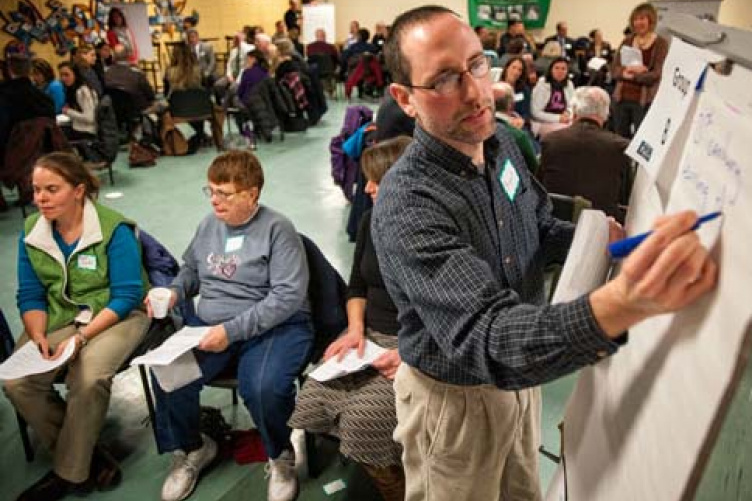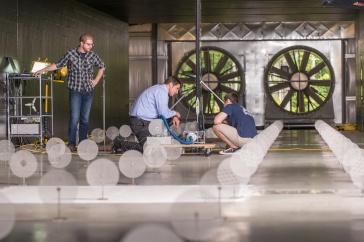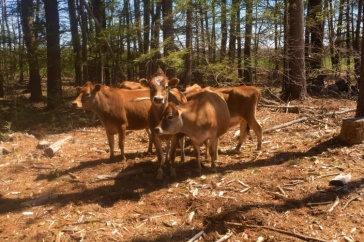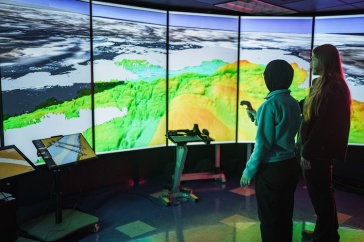
The conversation begins at Dover Listens event.
Word has it that when Dover Listens holds a meeting, it starts on time, sticks to the schedule, and ends on time. By 6 p.m. on a Thursday night, a crowd of about 120 people fills the cafeteria at the McConnell Center. A lot of them are very happy to see that there’s free coffee and snacks in addition to onsite childcare.
This community conversation, “Strong Communities, Strong Schools,” is being conducted with the support of N.H. Listens, a civic engagement initiative of the Carsey Institute at UNH. N.H. Listens, funded in part by the New Hampshire Charitable Foundation, is providing guidance and resources to Dover Listens, a local partner, to facilitate three meetings focusing on the future of education in the city. Like many cities all over the country, Dover wrestles with a huge need to support K–12 schools while juggling with the realities of limited resources.
Tonight’s meeting is the kick-off event as these community members seek to distill some recommendations to present to the City Council, School Board, and Dover Public School Administration, which have endorsed the conversations. A slew of sponsors, ranging from Foster’s Daily Democrat, to Hannaford Brothers, Fiddlehead Farms, and Adelle’s Coffeehouse, has chipped in to cover the modest expenses.
“N.H. Listens has been working at facilitating community conversations since 2011,” says Michele Holt-Shannon, associate director. “We realized pretty quickly how important it is to have local partners.” N.H. Listens now has nine regional and local partner organizations that work to create civic infrastructure for community conversations on challenging public issues. These groups are independent from N.H. Listens, but all of them sign on to the same principles. With about 130 trained facilitators in the N.H. Listens database, when a group, such as Dover Listens, comes to N.H. Listens to take on a big issue, they’ve got facilitators to help out.
|
Michele Holt-Shannon, associate director of N.H. Listens |
Mixing It Up
“The big thing is to get a good mix in the room,” explains Holt-Shannon, who is also the co-chair of Dover Listens. “More and more, we live in homogeneous communities. So, we may be less practiced at talking with people who believe differently than we do. We need to talk about issues with people who have markedly different opinions than our own.”
N.H. Listens facilitators go through an intensive training, which entails learning how to be nonpartisan. “Our facilitators work to get everyone’s voice heard,” says Holt-Shannon. “For example, we take some time with introductions. Knowing that both our kids play soccer is important. It can make talking about more difficult topics easier.”
Holt Shannon notes, “Sometimes the conversation may not result in an answer but can give the group a pathway to a solution.”
As participants check in they are assigned a letter, and soon everyone is divided up into eight groups of about 15. The mix is looking good. There are retired folks, teachers, nurses, a police officer, members of the City Council, parents, some K–12 students, and UNH students. For weeks now, members of Dover Listens have pounded the pavement talking to organizations all over the city to encourage participation. Their work has paid off.
After Holt-Shannon welcomes everyone and lays out the ground rules, the facilitators begin introductions.
|
A facilitator lists ideas. |
Group Awesome
In Group A, soon to be known as “Group Awesome,” members begin to layout their hopes for education in the city:
A school nurse mentions the need for more support staff.
A teacher observes that classes get bigger and bigger.
Someone else talks about running schools on an outdated agricultural calendar — why not go year round?
“Given the recent research on adolescence, why not start high school later in the morning?”
“Why not have a transition plan from high school to college or job for every individual student in the high school?”
“The schools are community resources — let’s open them to senior citizens, to the community.”
When the facilitator changes the task to refining the list and members tackle that:
“I see a grouping just on community involvement.”
“Then a group of budget items…”
“Community — isn’t that what goes on outside of school? How do you define that?”
“Ok, let’s check off on the big list what we’ve included so we don’t leave anything out,” says the facilitator.
And then it’s time for a member from each group to report out.
Dot Voting Is Fun
A lot of heads nod in agreement as members report. When one man reads the suggestion that middle schoolers should have recess, because after all they’re just kids, the adjacent group, which has a middle schooler in its midst, cheers.
The flip charts are lined up and each person is given three green dots to put next to items they find important. Everyone ponders their choices, mingles a bit, and soon everybody is chatting.
After this meeting and subsequent meetings, N.H. Listens will use the results of the conversations to write a summary report for Dover Listens.
For Shayla Riggs, a UNH junior from Dover, with a self-designed major in “community engagement and education,” listening to the reports was enlightening. “There were a lot of intelligent, well thought-out ideas presented that may never have come to light without this meeting,” says Riggs. “The most resounding ideas to me were the ones having to do with creating stronger ties between community members, teachers, and the school board.”
Bruce Mallory, director of N.H. Listens, has clearly enjoyed this kick-off. He has a knack for understanding how events like this can enrich democratic engagement. After all, this is not about bringing in consultants, it’s about strengthening communities.
“N.H. Listens is a unique program nationally,” says Mallory. “I just got back from New York City where I met with the Rockefeller Brothers Foundation. They wanted to know, ‘How do you do this’?”
To learn more and to read reports from other community conversations, visit N.H. Listens.
Originally published by:
UNH Today
-
Written By:
Staff writer | Communications and Public Affairs



















































